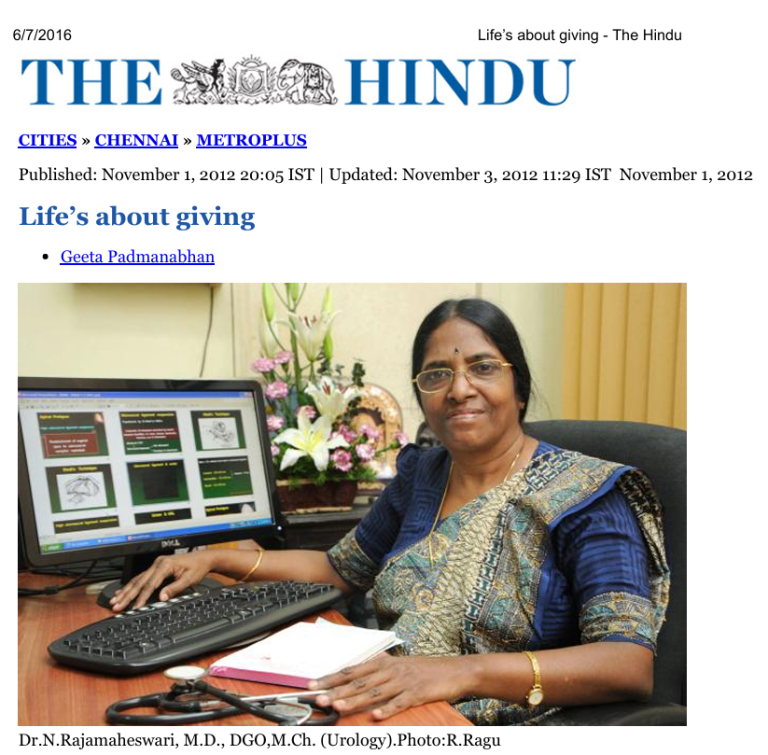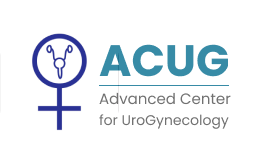Life’s about giving to THE HINDU

The country’s first and foremost urogynaecologist Dr. Rajamaheshwari talks to GEETA PADMANABHAN on how her specialisation has been a trendsetter in healthcare for women.
How is a super speciality surgeon born? “Guilt drove me,” says Dr. Rajamaheswari, the country’s first urogynaecologist. Accidental ureter injury she caused to a patient while performing a hysterectomy, and her dissatisfaction over the repair job by a urologist “spurred me to specialise in urology,” she writes in the International Urogynaecology Journal. “My journey as an urogynaecologist was neither expected, nor dreamt of.” A journey in which Dr. Rajamaheswari chose to do the unheard of — again and again.
With an MBBS from Thanjavur Medical College, in 1971 she moved to Chennai for her MD at the Institute of Obstetrics and Gynaecology attached to the Madras Medical College. After handling complicated referrals coming from 6070 village hospitals, in 1982, she did the
unthinkable: she returned to Thanjavur Medical College hospital. Working among rural women, “I saw countless gynaecology cases resulting in urological complications. I had to enhance my surgical skills, do a course in female urology.”
She smiles recalling her first day in a Urology department at a Chennai government hospital. The faculty had no experience training obstetricians-gynaecologists and the unit chief looked at her with scepticism, she says. “I was forced on them, they half expected me to leave soon.” She would continue, for she knew women hardly came for urological treatment; they suffered in silence. A urogynaecologist in 1985, she was appointed full fledged head of the Urology department, Kasturba Gandhi Hospital in 1986. “Incharge at 30, I was scared,” but she learnt, innovated, standardised, till eventually, the learning curve got shorter. When she put down the keys on August 31, 2012 she had
created a visible history of remarkable achievement.
In 1986, urogynaecological healthcare was unknown, suffering was not. Unattended and botchedup deliveries, tumours, caesareans, perennial pregnancies left scores of young women with pain, prolapsed uterus, urinary tract infections and that curse, incontinence. Such women became social outcasts, lost their jobs and some even contemplated suicide. “I was eager to provide the latest, advanced surgical treatment to underprivileged women suffering from urogynaec miseries,” says Dr. Rajamaheswari. She needed to tell them they were not alone, prove it’s possible for Government hospitals to offer prompt, appropriate treatment with sophisticated equipment on a par with that of corporate outfits.
It was difficult, she admitted, adding wryly. Why do you need this Urogynaecology department, she was asked. Urology/Obstetrics-gynaecology are overlapping fields but neglected, she argued. Our birth rate is high, population is high, where will careseekers go, she demanded. “I fought till I retired, for change of curriculum,” she says.
She acknowledges Government help — Her department went from scratch (three beds, minimal facilities) to stateof theart, to accommodate 100 patients. She added an exclusive fistula ward. She wouldn’t allow payment, but in 2007 started a Governmentapproved, revenue generating training programme and invited international experts to share experiences. She spent 80 per cent of the fee on improving facilities, and created a corpus fund. “Our aim was to bridge the gap with reference to medical care in Obstetricsgynaecology. Women drop in at the outpatient counter, collect a ticket, come straight to the specialist.”
Will she join a private hospital now? Yes, provided “they permit me to treat poor patients with fistula free. “I operate in various hospitals. Give me an attached clinic and a free hand to continue my service.”
National, international honours have been hers, but she delights in thankyou notes. “I am blessed to have had the opportunity to serve, to have been associated with Prof. Vijaya who persuaded me to specialise in Obstetrics-gynaecology, Bhanumathi, my devoted nursing assistant, and people like Dr. Bob Shull.” Yes, she feels fulfilled, she has done her duty as a doctor, as a human being. “You make a living with what you get; you make a life with what you give,” she quotes.
Impact on Healthcare Management
Dr. Rajamaheswari’s contributions to healthcare go beyond surgeries:
- In 2003, she established a dedicated fistula ward at the Government Kasturba Gandhi Hospital for Women and Children, Chennai, offering a safe and dignified space for women affected by fistulas.
- She introduced advanced diagnostic equipment such as urodynamic and endoscopic machines, improving the standards of care in public hospitals to align with international practices.
Impact on Service and Community Welfare
Beyond her medical contributions, Dr. Rajamaheswari has also been an advocate for holistic care:
- She initiated welfare funds for underprivileged patients and led efforts for blood donation campaigns.
- Her inspiring journey was featured in the International Urogynaecology Journal in an article titled “My Journey,” where she shared her personal and professional experiences.
Impact on Cost-Effective Healthcare
Dr. Rajamaheswari pioneered the concept of “Minimum Cost, Maximum Quality”:
- She improved efficiency in patient care and enhanced the overall quality of life for patients.
- Her efforts in resource management included environmental conservation measures, such as reducing water and electricity consumption and promoting the safe disposal of medical waste in hospitals.
Impact of Training and Education
As a dedicated educator, Dr. Rajamaheswari’s efforts in training the next generation of urogynaecologists have had far-reaching effects:
- In the 1990s, she organized programs to raise awareness about vaginal delivery techniques and preventing obstetric fistulas.
- Her Perineal Injuries and Episiotomy workshops, conducted with international experts, have shaped the training of urogynaecological procedures across India and neighboring countries.
- In 2005, she introduced India’s first fellowship training in Urogynaecology and established an international exchange fellowship program, creating a global network for skill-sharing.
- Her “train the trainer” model has empowered over 100,000 specialists, dramatically improving access to high-quality care for women in need.
Academic Contributions:
- 19 International publications
- 14 Indian publications
- 13 chapters in leading medical textbooks
- 3 patient information booklets
- 19 surgical videos, instrumental in teaching complex procedures.

